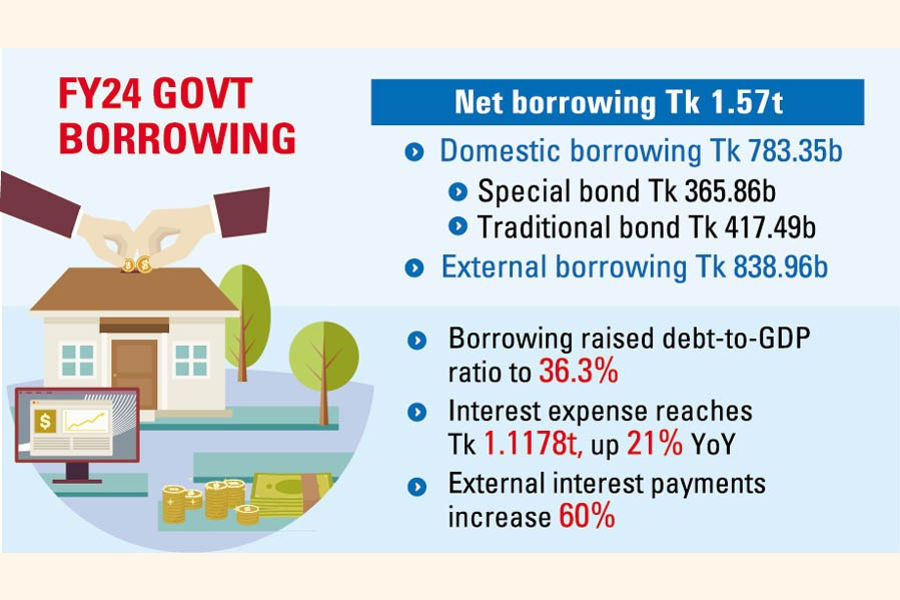
Published :
Updated :

Special bonds, issued to pay mainly fertiliser importers, formed the bulk portion of the government's domestic borrowing in FY24, according to official documents.
The government issued long-term fixed-income instruments - referred to as special bonds - and banks purchased those to release funds to fertiliser importers and power producers. These bonds, with maturities of seven to eight years, pay interest coupons to banks.
In total, the government issued special bonds of Tk 365.86 billion, accounting for 47 per cent of the funds raised through bonds during the 2023-24 fiscal year, as per Finance Division documents.
Banks borrowed from the Bangladesh Bank through these instruments, effectively leading to "money creation". This type of bond is relatively new in Bangladesh's fiscal management, as the government typically relies on traditional bonds with maturities ranging from two to 20 years.
On the other hand, the government raised Tk 417.49 billion through traditional bonds in FY24.
The government's reliance on short-term fixed-income instruments called Treasury bills (T-bills), which have maturities within one year, was dominated by 91-day bills.
Net financing through T-bills amounted to Tk 97.65 billion in FY24, although long-term instruments like T-bonds remained the government's preferred choice. Net borrowing through T-bonds, including special bonds, totalled Tk 783.35 billion in that financial year.
Overall, net government borrowing during the fiscal year stood at Tk 1.57 trillion, with external borrowing surpassing domestic borrowing. External sources contributed 53.4 per cent (Tk 838.96 billion) of the total amount.
This borrowing increased the debt-to-gross domestic product (GDP) ratio to 36.3 per cent, which is still within the safe range of 60 per cent that is used as a benchmark to assess the debt burden in emerging economies.
In the meantime, interest expenses also surged in FY24, reaching Tk 1.1178 trillion, 21 per cent higher than the previous fiscal year.
External interest payments rose by 60 per cent due to the commencement of interest payments on several major foreign loans.
Economists and bankers noted a shift in the FY24 government borrowing dynamics due to the introduction of special bonds.
"The government resorted to such measures due to liquidity shortages," said Dr Zahid Hussain, a former lead economist at the World Bank's Dhaka office.
He said this type of money creation may have contributed to inflationary pressure.
Bangladesh experienced high inflation of 9.72 per cent in FY24.
Hussain also pointed out that weak revenue collection and rising interest payments had exacerbated the government's financial challenges.
Syed Mahbubur Rahman, chief executive officer and managing director of Mutual Trust Bank, told The Financial Express, "The government issued the bonds, and we secured funds from the central bank to pay fertiliser importers and others. However, we are paying interest on these instruments."
jasimharoon@yahoo.com


 For all latest news, follow The Financial Express Google News channel.
For all latest news, follow The Financial Express Google News channel.